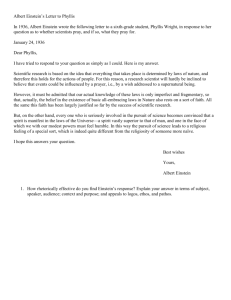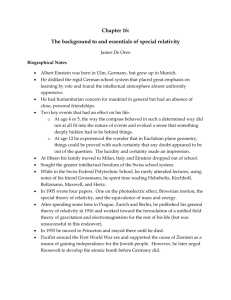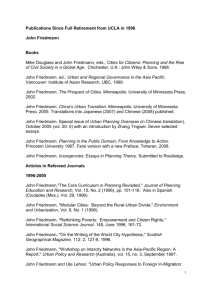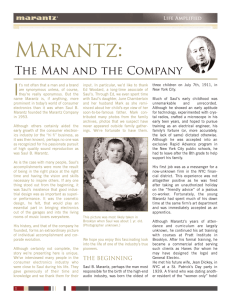Design and Conduct of CR Syllabus 2014-15
advertisement
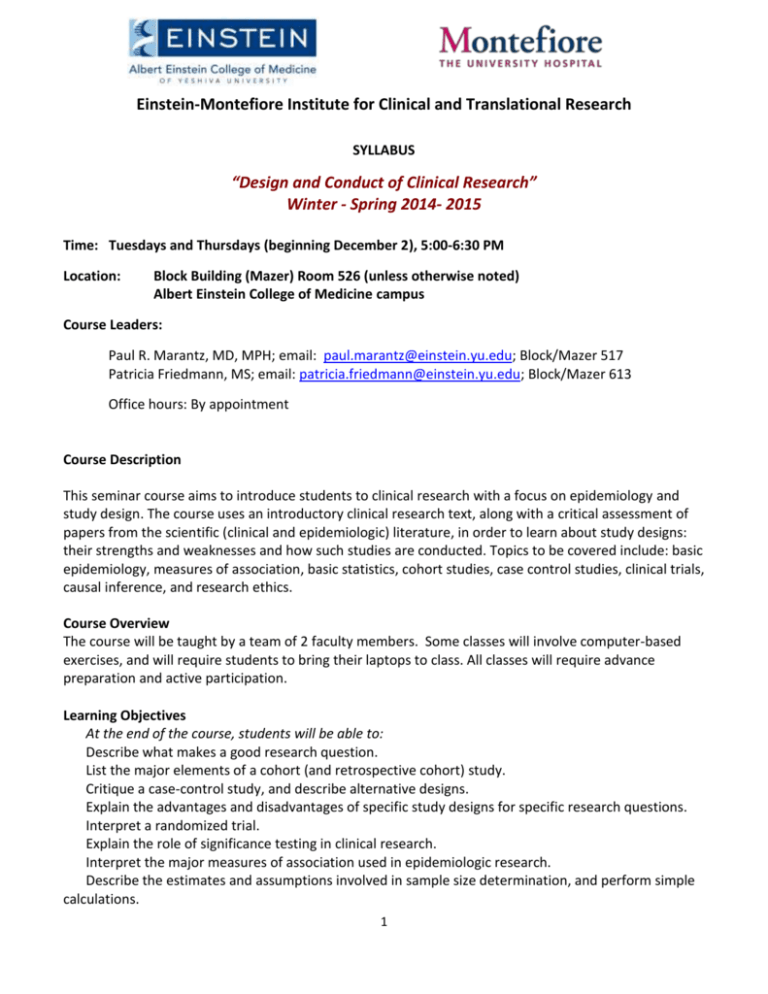
Einstein-Montefiore Institute for Clinical and Translational Research SYLLABUS “Design and Conduct of Clinical Research” Winter - Spring 2014- 2015 Time: Tuesdays and Thursdays (beginning December 2), 5:00-6:30 PM Location: Block Building (Mazer) Room 526 (unless otherwise noted) Albert Einstein College of Medicine campus Course Leaders: Paul R. Marantz, MD, MPH; email: paul.marantz@einstein.yu.edu; Block/Mazer 517 Patricia Friedmann, MS; email: patricia.friedmann@einstein.yu.edu; Block/Mazer 613 Office hours: By appointment Course Description This seminar course aims to introduce students to clinical research with a focus on epidemiology and study design. The course uses an introductory clinical research text, along with a critical assessment of papers from the scientific (clinical and epidemiologic) literature, in order to learn about study designs: their strengths and weaknesses and how such studies are conducted. Topics to be covered include: basic epidemiology, measures of association, basic statistics, cohort studies, case control studies, clinical trials, causal inference, and research ethics. Course Overview The course will be taught by a team of 2 faculty members. Some classes will involve computer-based exercises, and will require students to bring their laptops to class. All classes will require advance preparation and active participation. Learning Objectives At the end of the course, students will be able to: Describe what makes a good research question. List the major elements of a cohort (and retrospective cohort) study. Critique a case-control study, and describe alternative designs. Explain the advantages and disadvantages of specific study designs for specific research questions. Interpret a randomized trial. Explain the role of significance testing in clinical research. Interpret the major measures of association used in epidemiologic research. Describe the estimates and assumptions involved in sample size determination, and perform simple calculations. 1 Identify ethical challenges in clinical investigation, and propose solutions to those challenges. Distinguish between associations and causal connections in etiologic research. Course Requirements & Grading The course will be graded “Honors/Pass/Fail”. (As per graduate school regulations, a grade of “incomplete” may be allowed if absolutely necessary at the discretion of the Professors) We plan to use a criterion standard for grading: i.e., Honors > 90%, Pass 65-90%, Fail < 65%. However, we reserve the right to ‘curve’ these cut-points if necessary. The grade will be determined using the following formula: Final examination (in-class; short-answer/short-essay): 70% Class participation as determined by faculty (preparation, contribution to discussion): 30% Final Exam There will be an in-class final exam. Angel Angel will be used as the main platform for posting course materials and communicating with students. Textbooks Designing Clinical Research, Hulley SB, Cummings SR, Browner WS, Grady DG, Newman TB., 4th Ed. Lippincott Williams & Wilkins; Philadelphia: 2013. ISBN-10: 1608318044 | ISBN-13: 978-1608318049 Course calendar; all classes 5:00-6:30 PM (Faculty Key: PF=Patricia Friedmann; PM=Paul Marantz): All Chapters are from Hulley et al. Other reading assignments will be available on Angel. Other readings (required and/or recommended) may be added as the course proceeds. Month Dec Tues 2 9 Thurs Faculty Topic PF/PM The Rise and Fall of Hormone Therapy 4 Developing a research question PF Sampling and Recruitment 11 Measurement 16 PF 18 Jan 6 PM 8 13 Chapters 3 and 4 Hays J et al. The Women’s Health Initiative Recruitment Methods and Results Ann Epidemiol 2003; 13: S18–S77. Hypothesis testing and Chapters 5 and 6 sample size estimation Sample size and Power In-class exercise Laboratory NOTE: THIS LABORATORY CLASS WILL BE HELD IN THE ‘TRAINING ROOM’ OF THE EINSTEIN LIBRARY: FORCHHEIMER BUILDING, ROOM 119N Cross-sectional and cohort studies Case-control studies PF Reading Assignment Gary Taubes, “Do we really know what makes us healthy?”, Sunday NY Times Mag, Sept 2007 Chapters 1 and 2 Clinical Trials I Chapter 7 Stampfer MJ, et al. A prospective study of postmenopausal estrogen therapy and coronary heart disease. N Engl J Med 1985; 313:1044-49 Chapter 8 Jick H, Dinan B, Rothman KJ. Noncontraceptive Estrogens and Nonfatal Myocardial Infarction JAMA 1978; 239(14):1407-1408 Chapters 10 and 11 15 20 PM 22 27 3 5 WHI Investigators. Risks and Benefits of Estrogen Plus Progestin in Healthy Postmenopausal Women. JAMA 2002;288:321-333. Research using existing data Chapter 13 Southern WN, Bellin EY, Arnsten JH. Longer lengths of stay and higher risk of mortality among inpatients of physicians with more years in practice. Am J Med. 2011; 124: 868-74. Chapter 9 Causal inference PM Evaluating diagnostic tests Research ethics PF/PM Review session FINAL EXAM 29 Feb Clinical Trials II Chapter 12 Readings TBN Chapter 14 Freeman, et al. Use of placebo surgery. NEJM 1999; 341: 988-92. Macklin R. Ethical problems with sham surgery. NEJM 1999; 341: 992-6. 3 Einstein-Montefiore Institute for Clinical and Translational Research “Design and Conduct in Clinical Research” Time: Tuesdays and Thursdays (beginning December 2, 2015) 5:00-6:30 PM Location: Mazer 526 Albert Einstein College of Medicine Campus Course Leaders: Paul R. Marantz, MD, MPH; email: paul.marantz@einstein.yu.edu; Block/Mazer 517 Patricia Friedmann, MS; email: patricia.friedmann@einstein.yu.edu; Block/Mazer 613 Office hours: By appointment Name: Email Address: Degree(s) Date of Birth: Social Security #: Home Address: Banner ID #: Work Address: Home Phone #: Work Phone #: Beeper # Cell #: Institution: Institutional E-mail address: Current Position: Primary Department: Location: What year did you complete CR101? Please submit completed form to nancy.marte@einstein.yu.edu and Merrilly.Calabrese@einstein.yu.edu
